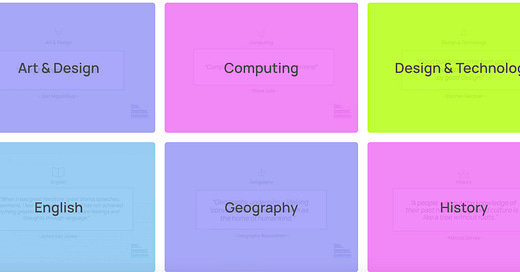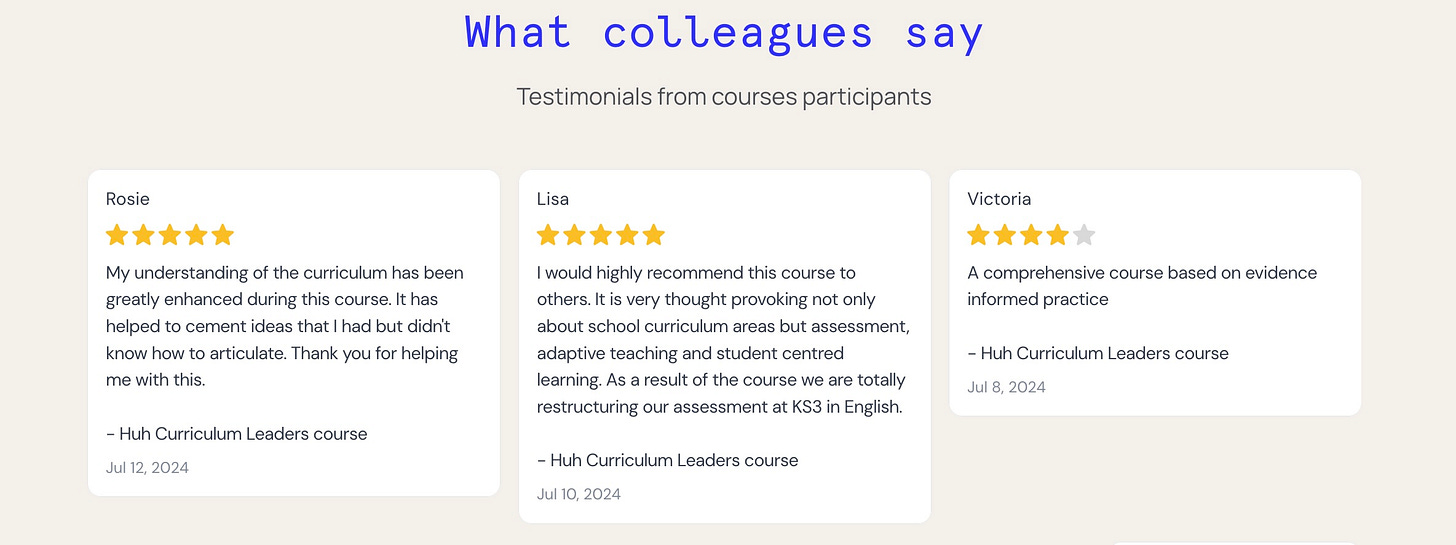When I talk with colleagues about what they hope for their subjects in terms of the impact on pupil’s learning, there’s sometimes a pause. Then a file gets opened, usually on a laptop and some complicated blurb gets pulled up.
There is a problem with this. If the intent needs to be read from a document, how real is it? What I mean by this is that there can be a gap between the words on the document and the reality of bringing it to life.
This is not to pick holes or to be mean. It’s about thinking through whether the fine words on a website match the way we actually talk about, implement and bring a subject to life.
Why is it even important to even be considering this? Well in my view, the subjects are not inert, they are not just items on a programme of study or exam specification.
The subjects are taught in schools because they are gateways into understanding the world, both from a human and intellectual point of view. We want our pupils to know more, remember more and be able to do more, and we also want them to develop as human beings.
As it happens, when we look at the importance statements in the purpose of study for each of the national curriculum subjects, we find this dual element in terms of the justification for teaching a particular subject. If we look at geography for example, the purpose of study talks about how a high quality geography education should:
'inspire in pupils a curiosity and fascination about the world and its people that will remain with them for the rest of their lives. Teaching should equip pupils with knowledge about diverse places, people, resources and natural and human environments, together with a deep understanding of the Earth’s key physical and human processes.. ‘
This is a big ambition for the subject!
So, when I am talking with colleagues about the purpose of teaching the subjects in their schools, these are the prompts we’ve found helpful:
What’s unique about this subject?
What’s magical about it?
What is the unique contribution this subject makes to the human and intellectual development for our pupils?
If we take each in turn: what’s unique about an individual subject? To take our geography example again, the subject helps pupils to appreciate that the world has been formed and changed by both natural and human processes
Then, what’s magical about each subject?! I make no apology for using the word magical! That’s because I truly believe that the individual subjects have the power to transform our pupils’ lives. So, what’s magical about geography?
Well, just look outside the window! What can we see? Buildings, roads, fields, clouds, rain, hills, streams, rivers? All these elements provide the route in to the subject and have the capacity to create a genuine sense of awe. Not in every moment, but every now and then. Sufficient to justify saying that there’s magic here!
The third question is to ask what is the unique contribution that this subject makes to the human and intellectual development for our pupils?
The way we might frame this is to ask ourselves, what would our pupils be missing out on if they came to school and they were not taught any design and technology, or religious education, or history or geography or any other subject?
The point of these questions is not to produce reams of documentation, but rather to prompt light touch conversations with colleagues.
In the work I have done with schools on this, they often provoke laughter and a light hearted approach to thinking about the purpose of study in the national curriculum. The laughter and light heartedness is important. It means that we are engaging with our whole selves on this important work.
I have found that to help with this process, it’s useful to have some quotes to play around with. So for example, if I am teaching art and design what do I make of this quote by Don Miguel Ruiz?
‘Every human is an artist’.
The point here is not to necessarily agree with the quote, but to say how would I sum up the importance and significance of this subject? And then quotes for each of the other subjects which you can download here.
Colleagues who use these quotes in department and staff meetings find that they provoke lively discussions. The point here is not necessarily to agree with the quotes, but to come up with our own way of talking about the importance of the subjects we teach.
Two things follow when we do this work.
The first is that we find that we are able to talk about the subject in a much more fluid way. It comes far more naturally to us and we find ourselves talking with increased enthusiasm because we have cut through to the heart of the subject.
This doesn’t mean that we necessarily are going to be experts, but we are going to have caught some of the spirit of the subject. This means we are able to talk to others about why the subject is important: to our pupils, parents, and any professional asking about the intent of the subject.
The second thing that happens is that it holds us to account for the quality of what lands on our pupils’ desks. If we are saying this is an important subject in these biggest terms and then we offer third rate work sheets, then there’s a mismatch which we need to pay attention to!
Until next time
Mary
For more on developing the curriculum, you might want to check out Curriculum Leaders, it’s an online course and the latest cohort is now open for booking.
John Tomsett and I cover the following:
1. Ways of working, curriculum triumvirate, primary and secondary distinctiveness
2. Principles of curriculum design
3. Sequencing and progression
4. Cognitive science and learning the curriculum
5. Intent
6. Implementation
7. Impact
8. Supporting staff, sustaining momentum
It’s had some terrific feedback!





